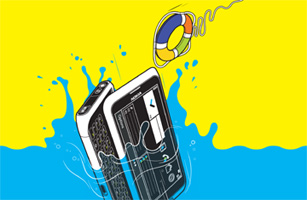
Nokia’s Stephen Elop certainly has a way with words. In February, in what might have been the most brutally honest corporate memo in decades, the recently installed CEO compared his company to an oil worker trapped on a burning drilling rig, facing a terrible choice. “He was surrounded by flames,” Elop wrote. “Through the smoke and heat, he barely made his way out of the chaos to the platform’s edge. When he looked down … all he could see were the dark, cold, foreboding Atlantic waters.”
Call it the parable of the burning platform. The Finnish mobile-phone manufacturer that had once been able to comfortably claim that its distinctive ringtone was the most listened-to melody in the history of music is watching its dominance go up in smoke. Since the launch of the iPhone in 2007, Nokia’s share of the smart-phone market has dropped from 51% to 27%, according to the research firm Gartner. In the midrange, phones carrying Google’s Android operating system have just surpassed Nokia’s smart phones in sales. And a host of low-priced Chinese competitors are nipping at its heels. Brand loyalty is at an all-time low. Like the oil worker, Elop, who had joined Nokia from Microsoft in September, needed to make a dramatic decision. And like the oil worker, he decided to jump.
The platform that Elop leaped from was Nokia’s own. On Feb. 11, two days after the memo’s release, Elop announced he would shelve Symbian, the proprietary platform that powered all the company’s phones. Instead, Nokia will team up with Microsoft in a “deep partnership” in which each company has a stake in the other’s success. With the software giant’s Windows 7 operating system, Nokia’s hardware expertise and both companies’ suites of programs and applications, the duo will attempt to take on Apple and Google in offering a complete package of hardware, software and third-party applications. “The game has changed from a battle of devices to a war of ecosystems,” said Elop.
That war, which will be waged around apps rather than hardware, is one that experts doubt Nokia can win. The company’s stock plunged 14% the day of the announcement as investment banks raced to downgrade their recommendations. In Finland, hundreds of Nokia workers walked off the job. Answering questions at a press conference two days later, Elop had to deny he was a Trojan horse sent by Microsoft. “Two turkeys don’t make an eagle,” crowed Google’s vice president of engineering Vic Gundotra on Twitter. In the next day of trading, the stock fell another 5%.